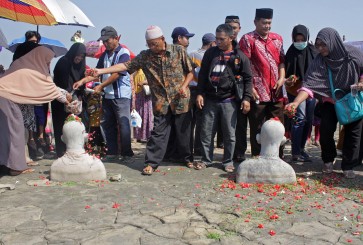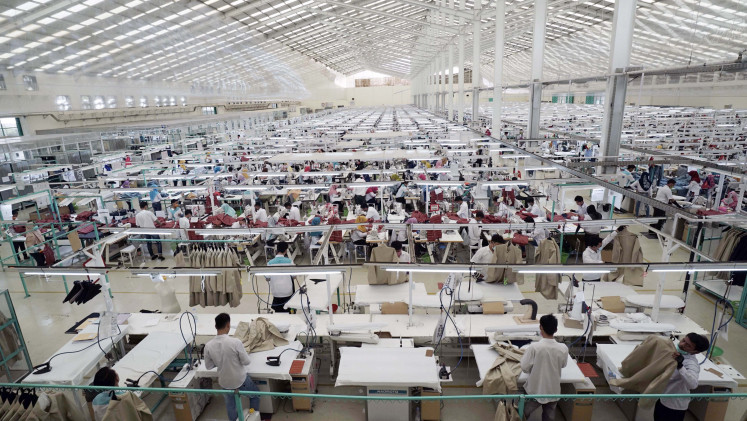Gas prices raised for power sector
A maximum cap on gas prices sold to power plants has been eased to ensure the economic feasibility of both gas and power producers
Change text size
Gift Premium Articles
to Anyone

A maximum cap on gas prices sold to power plants has been eased to ensure the economic feasibility of both gas and power producers.
The Energy and Mineral Resources Ministry has issued a revision of ministerial decree No. 11/2017 on gas use for the power sector, which regulates the price cap of gas sold to both state-owned electricity firm PLN and independent power producers (IPP).
The revision raises the price cap of piped gas at the plant gate to 14.5 percent of the Indonesian Crude Price (ICP) from 11.5 percent in the previous iteration. The ministry recently announced the ICP for July as at US$45.48 per barrel, translating the maximum gas price at around US$7 per million metric British thermal units (mmbtu). The ICP rose from US$43.66 the previous month.
Moreover, the same revision, through Ministerial Decree No. 45/2017, also puts more focus on domestic absorption of liquefied natural gas (LNG) in comparison to imported LNG.
While the previous regulation stipulates that power producers can import LNG if the price of domestically piped gas is higher than the price cap. However, the new regulation states that power producers can only import LNG if it is cheaper than those produced at home and delivered at the plant gate.
Analysts have considered the change as an improvement from the previous policy as it is economically unfeasible to sell transmitted gas below the ceiling.
Wood Mackenzie Asia Pacific senior analyst for gas and power Edi Saputra said the previous regulation had caused several deadlocks in gas sales and purchase agreements.
“No one was willing to sell gas at that level. They were unwilling to sign gas sales and purchase agreements because 11.5 percent made it uneconomical and unviable,” he told The Jakarta Post on Friday.
“When the price is too low, it may cause supply scarcity because no one wants to sign onto projects and electricity firms will not be able to get gas.”
The government initially set a price ceiling in order to make gas cheaper and boost domestic consumption of gas, and make power generation more efficient to support the development of the industrial sectors.
PLN’s latest electricity procurement business plan (RUPTL) has projected that electricity procured from gas will rise to 26.6 percent by 2026.
Under the current ICP, the new price ceiling is set at a maximum of around US$6.8 per mmbtu, which Edi deemed much more reasonable than the alternative of diesel, which currently costs around US$13 to $14 per mmbtu.
Furthermore, the higher price of gas is unlikely to affect electricity prices sold to the public as the proportion of gas-procured electricity is much smaller at around 25.8 percent in comparison to coal-fired power plants at 55.6 percent by the end of April.
Low-cost power generation from coal would be able to balance any slight increases in production from gas so that electricity prices will not be impacted.
Edi said that any implementation of a price cap would be unsustainable as the ICP would continue to fluctuate depending on global oil prices. Instead, the government needed to set up a new mechanism to calculate fair gas prices to be sold to power producers.
Power producers are not so sure about the price cap increase.
Ali Herman Ibrahim, the chairman of the Indonesian Private Electricity Producers Association (APLSI), said that while the 14.5 percent cap was still reasonable, many IPP would prefer it to be lowered to 12 percent at the plant gate.
“To be fair, the gas price should vary between US$5 to $8 [per mmbtu] depending on the [wellhead] price and also the delivery location,” he said.
In addition to setting a new price ceiling for gas sold to the power plants, the Energy and Mineral Resources Ministry has recently approved the increase of gas sold from ConocoPhilips’ Grissik field in the Corridor block to state-owned gas firm PT Perusahaan Gas Negara (PGN).
The price has been increased to US$3.5 per mmbtu from $2.6 for 22.73 billion British thermal units per day (BBTUD) starting August until the contract ends in 2019.
Deputy Energy and Mineral Resources Minister Archandra Tahar said that the new gas price for ConocoPhilips had long been discussed prior to the revision on Monday.
“We are just looking at this fairly as there is a pretty wide margin in the selling price from ConocoPhilips to PGN, and PGN to the industrial sector. ConocoPhilips thought that it deserves to enjoy this so we have reviewed it,” he said.









